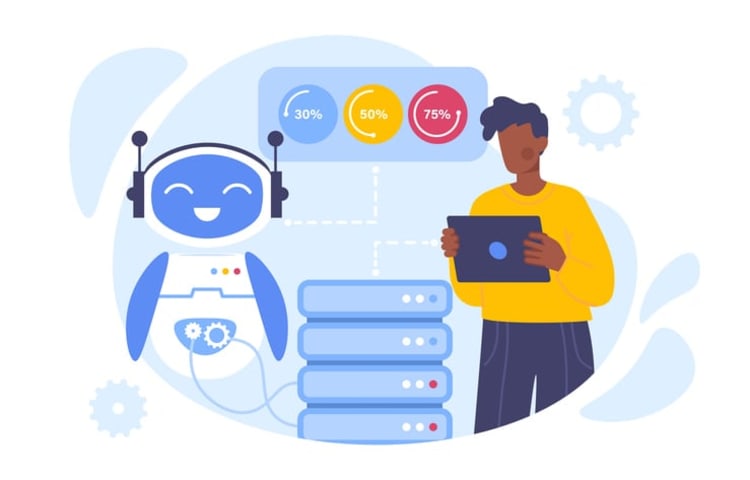Imagine a world where your business could harness the power of AI and machine learning to analyze every customer interaction, providing insights that could transform your sales performance, marketing strategies, and customer experience. That world is here, thanks to conversation intelligence software! In this blog post, we’ll dive into the benefits, features, and best practices of conversation intelligence, and explore real-life success stories of companies that have unlocked its potential.
Key takeaways
- Conversation Intelligence is a powerful tool that uses AI and machine learning to provide businesses with actionable insights.
- Benefits include improved customer experience, sales performance, and overall success by optimizing contact centers, elevating customer experience, boosting sales performance & gaining in-depth customer insights.
Understanding conversation intelligence

Picture this: your sales team is making hundreds of calls every day, but do you truly understand what’s happening during those customer conversations? Conversation intelligence software is designed to analyze conversation data and uncover valuable insights for businesses, providing a competitive edge and better understanding of customer interactions. It’s like having a superpowered assistant that can listen in on every call, deciphering the complex web of human communication, and turning it into actionable insights.
The working mechanism of conversation intelligence is based on the collaborative power of machine learning and natural language processing (NLP). These advanced technologies enable conversation intelligence platforms to process vast amounts of conversation data, extracting meaningful insights that would be nearly impossible for humans to identify manually. The result? A treasure trove of information that can improve customer experience, boost sales, and gain a deeper understanding of your customers.
What is conversation intelligence?
Conversation intelligence is the process of using AI and machine learning to analyze conversation data from customer interactions, enabling businesses to:
- Uncover valuable insights
- Make data-driven decisions
- Enhance customer experience
- Optimize contact centers
- Identify top performers and best practices in sales interactions
With the help of conversation intelligence tools, sales leaders can leverage these benefits to improve their overall sales performance.
Imagine being able to monitor and analyze every sales call in real-time, gaining insights into customer behavior, preferences, and sentiment. This level of understanding allows businesses to tailor their approach to each customer, resulting in better customer satisfaction and improved sales performance.
Conversation intelligence platforms, such as a conversation intelligence tool, extend their capabilities beyond phone calls, processing conversation intelligence data from video meetings, emails, and chat transcripts, thus offering a comprehensive view of customer interactions.
The role of AI and machine learning
Artificial intelligence and machine learning are integral to conversation intelligence, offering real-time transcription, sentiment analysis, and integration with CRM and other tools. With the help of AI, conversation intelligence platforms can quickly and accurately transcribe calls, enabling sales managers to monitor multiple calls at once and provide tailored coaching to their team members.
Sentiment analysis is another powerful feature of conversation intelligence, allowing businesses to understand the emotions and feelings of customers during interactions. This insight enables companies to tailor their approach to each customer, ensuring a positive customer experience and building stronger relationships.
Conversation intelligence platforms utilize AI and machine learning to convert raw conversation data into actionable insights, thereby propelling business success.
Enhanced Virtual Interactions
Integrate Kumospace to bolster your conversation intelligence strategies by fostering immersive and engaging virtual conversations. Offering a spatial environment where discussions are not just heard but visually and spatially experienced, Kumospace can enrich customer and team interactions. This innovative platform, when paired with conversation intelligence tools, amplifies your capacity to analyze and derive insights from communicative behaviors, seamlessly blending advanced technology with enriched communication experiences in your analytical endeavors.
Benefits of conversation intelligence for businesses

The benefits of conversation intelligence for businesses are manifold. By analyzing customer interactions in real-time, companies can elevate customer experience, boost sales performance, and gain profound customer insights.
From optimizing contact centers to identifying best practices and areas for improvement, conversation intelligence has the potential to revolutionize the way businesses interact with their customers and drive growth.
Enhanced customer experience
Providing an exceptional customer experience is crucial for any business, and conversation intelligence can play a pivotal role in achieving this goal. By leveraging the insights gained from customer interactions, businesses can make adjustments to their approach, ensuring a better experience for their customers. For example, live sentiment analysis can help contact center managers identify calls that are going off track and step in to assist the agent, resulting in improved customer satisfaction.
In addition to enhancing the customer experience, conversation intelligence can also help businesses:
- Uncover customer preferences, pain points, and behavior
- Gain a deeper understanding of customers
- Personalize interactions
- Better cater to individual needs
- Foster stronger relationships with their customers.
Improved sales performance
Conversation intelligence can have a significant impact on sales performance by identifying best practices and areas for improvement in sales interactions. By analyzing sales calls and gaining insights into:
- Which conversation styles and scripts are most effective
- How to refine their approach
- How to build stronger relationships
- How to close more deals
Sales teams can use conversation intelligence to improve their overall sales performance through effective sales conversations.
Sales managers can also utilize conversation intelligence to develop successful training programs for new reps. By pinpointing the techniques used by top performers, managers can tailor their training and coaching to ensure that all team members are adopting the most effective strategies. This not only improves the overall sales team’s performance but also fosters a culture of continuous learning and development.
In-depth customer insights

Conversation intelligence provides businesses with invaluable insights into their customers, helping them make data-driven decisions and improve products and services. By analyzing customer conversations, businesses can gain insights into customer behavior, preferences, and sentiment, allowing them to spot opportunities for improvement and areas of potential growth.
These insights can also inform marketing strategies, enabling businesses to better target their campaigns and understand the needs of their customers. By leveraging conversation intelligence, companies can gain a competitive edge in the market and drive growth by continually adapting and refining their approach based on the insights gained from customer interactions.
Top features of conversation intelligence platforms

The top features of conversation intelligence platforms include real-time transcription and analysis, sentiment analysis, and integration with CRM and other tools. These features enable businesses to monitor and analyze customer interactions as they happen, providing immediate insights and feedback that can be used to improve customer experience, sales performance, and overall business success.
We shall now examine these features in detail and see how they assist businesses in unlocking the potential of conversation intelligence.
Real-time transcription and analysis
Real-time transcription and analysis enable businesses to:
- Monitor and analyze customer interactions as they happen, providing immediate insights and feedback
- Keep an eye on multiple calls at once, identify areas for improvement, and provide tailored coaching to their team members
- Ensure that team members can catch up on meetings they missed by reading the transcripts, ensuring that no valuable information is lost.
Businesses can identify trends and understand customer preferences, ultimately making data-driven decisions to enhance their products and services, by capturing and analyzing customer conversations in real-time. This level of insight allows companies to stay ahead of the curve, anticipate customer needs, and continually adapt their approach based on the insights gained from customer interactions.
Sentiment analysis
Sentiment analysis is a powerful feature of conversation intelligence platforms that helps businesses understand the emotions and feelings of customers during their interactions. By analyzing the sentiment of customer conversations, businesses can identify positive and negative interactions, allowing them to tailor their approach to each customer and ensure a positive customer experience.
In addition to providing valuable insights into customer emotions, sentiment analysis can also help businesses in the following ways:
- Identify potential issues or areas for improvement in their products and services
- Proactively address concerns
- Continually refine their approach based on the insights gained from customer interactions
Integration with CRM and other tools
Integration with CRM and other tools is an essential feature of conversation intelligence platforms, as it allows businesses to:
- Streamline their workflows
- Ensure that conversation intelligence insights are easily accessible and actionable
- Create a seamless flow of information between their various tools
- Make data-driven decisions
- Improve customer experience
For example, integrating conversation intelligence with CRM systems can provide sales teams with valuable insights into customer preferences and behavior, enabling them to tailor their approach to each customer and close more deals. Additionally, integration with call tracking software and other tools can help businesses stay compliant with industry regulations and minimize risks associated with customer data and call recording.
How businesses can leverage conversation intelligence

Businesses have a multitude of methods to harness conversation intelligence for enhancing their operations and promoting growth. From enhancing customer support and boosting sales coaching to streamlining marketing efforts, conversation intelligence offers a wealth of opportunities for businesses to gain a competitive edge and better serve their customers.
We will now delve into some specific methods through which businesses can utilize this powerful technology.
Improving customer support
Conversation intelligence can help businesses improve customer support in the following ways:
- Identifying areas for improvement
- Providing real-time guidance to support agents
- Analyzing customer interactions to gain insights into common pain points and preferences
- Identifying areas where support agents may need additional training or resources
By utilizing conversation intelligence, businesses can enhance their customer support and provide a better experience for their customers.
For example, live sentiment analysis can help contact center managers identify calls that are going off track and step in to assist the agent, resulting in improved customer satisfaction and a more efficient support process.
By leveraging conversation intelligence, businesses can continually refine their customer support efforts and ensure that they are meeting the needs of their customers.
Boosting sales coaching
Conversation intelligence can boost sales coaching by analyzing sales interactions and identifying best practices and areas for improvement. By leveraging the insights gained from sales calls, managers can develop targeted training programs that focus on the most effective strategies and techniques, helping their teams to become more successful in their sales efforts.
For instance, conversational AI can help sales reps in the following ways:
- Understand which conversation styles and scripts are most effective for building relationships and closing deals
- Incorporate these insights into sales coaching and training programs
- Ensure that their sales team is equipped with the knowledge and skills needed to excel in their roles.
Streamlining marketing efforts
Conversation intelligence can help businesses streamline marketing efforts by providing insights into customer preferences and behavior, allowing them to tailor their marketing strategies accordingly. By leveraging revenue intelligence, companies can make data-driven decisions to optimize their sales and marketing efforts.
By analyzing customer conversations, businesses can identify trends, understand customer needs, and create more targeted marketing campaigns. For example, insights gained from conversation intelligence can inform content marketing strategies, enabling businesses to create more engaging and relevant content that resonates with their target audience.
By leveraging conversation intelligence, businesses can ensure that their marketing efforts are data-driven and optimized for success.
Best practices for implementing conversation intelligence

Implementing conversation intelligence effectively is crucial for businesses to maximize the potential benefits of this powerful technology.
In the following, we will cover:
- Best practices for data privacy and compliance
- Delivering adequate training and onboarding
- Perpetually evaluating and enhancing your conversation intelligence implementation.
Ensuring data privacy and compliance
Ensuring data privacy and compliance is crucial when implementing conversation intelligence, as businesses must adhere to regulations regarding customer data and call recording. To ensure compliance, businesses should inform both parties in a call that the conversation is being recorded and take steps to protect sensitive information, such as payment details.
In addition to adhering to call recording regulations, businesses should also ensure that their conversation intelligence platform is compliant with data protection laws, such as the General Data Protection Regulation (GDPR) and the California Consumer Privacy Act (CCPA). By prioritizing data privacy and compliance, businesses can protect their customers and avoid potential legal risks.
Training and onboarding
Training and onboarding are essential for businesses to effectively implement conversation intelligence and ensure that employees understand how to use the platform and interpret insights. By providing comprehensive training and support, businesses can ensure that their team members are equipped to make the most of conversation intelligence tools and apply the insights gained to improve customer interactions and drive business growth.
In addition to training employees on how to use the platform, businesses should also provide ongoing support and resources to help team members stay up to date with the latest developments in conversation intelligence. This can include offering workshops, webinars, and other educational resources to help employees continually refine their skills and stay ahead of the curve.
Continuously evaluating and improving
Continuously evaluating and improving conversation intelligence implementation helps businesses stay ahead of the curve and ensure that they are maximizing the benefits of the technology. By setting up a feedback loop to evaluate the effectiveness of the platform and making adjustments as needed, businesses can ensure that they are getting the most accurate insights and driving the best possible results.
Some ways to continuously evaluate and improve conversation intelligence implementation include tracking key performance indicators (KPIs), gathering feedback from team members, and staying informed about industry trends and best practices. By prioritizing continuous improvement, businesses can ensure that their conversation intelligence efforts remain effective and relevant in an ever-changing business landscape.
Summary
Conversation intelligence has the potential to revolutionize the way businesses interact with their customers, providing valuable insights that can drive growth and improve customer experience. By harnessing the power of AI and machine learning, businesses can analyze customer interactions in real-time, gain insights into customer preferences and behavior, and make data-driven decisions that drive success. From enhancing customer support and boosting sales coaching to streamlining marketing efforts, conversation intelligence offers a wealth of opportunities for businesses to gain a competitive edge and better serve their customers.
FAQs
Conversation intelligence is a type of software that uses artificial intelligence (AI) to analyze speech and text data from customer conversations, providing actionable insights to help sales teams improve their customer interactions. It can identify customer sentiment, detect key topics of conversation, and provide insights into customer behavior. It can also be used to identify sales opportunities, track customer engagement, and measure the effectiveness of sales strategies. By leveraging AI, conversation intelligence can provide sales teams with valuable
Conversational intelligence is used to create more personalized and welcoming experiences, for instance when a customer calls a contact center and is greeted by name. Chatbots, virtual agents, and voice assistants are popular examples of conversational AI.
Conversation intelligence focuses on analyzing human-to-human conversations, while conversational intelligence is about enabling humans and machines to interact meaningfully. The former is about understanding the nuances of human communication, while the latter is about creating a meaningful dialogue between humans and machines.
Yes, there are AI chatbots available to have conversations with, such as Google Cloud's Vertex AI Conversation, OpenAI's ChatGPT app, Replika and Google's Bard. Replika is the most popular conversational AI chatbot, with millions of users talking to their own AI friends.
Conversation intelligence uses AI and ML to analyze customer conversations, providing insights into customer needs, feelings, and actions that can be leveraged to improve customer experience and business growth. By leveraging AI and ML, conversation intelligence can provide valuable insights into customer conversations. These insights can be used to better understand customer needs, feelings, and actions. This understanding can then be used to improve customer experience and drive business growth.





